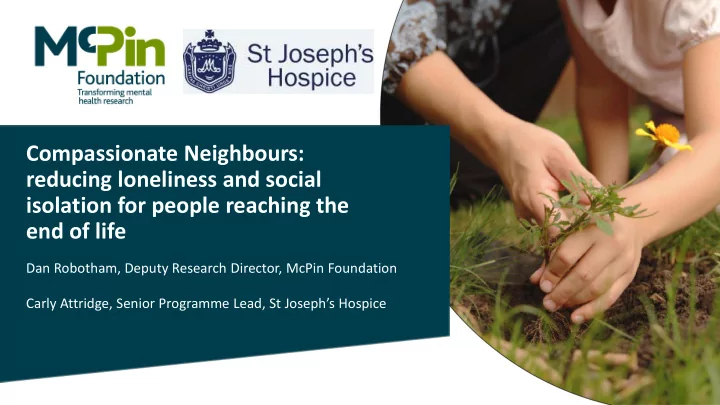

Compassionate Neighbours: reducing loneliness and social isolation for people reaching the end of life Dan Robotham, Deputy Research Director, McPin Foundation Carly Attridge, Senior Programme Lead, St Joseph’s Hospice
• Public health approach to end of life care • A social movement to support ‘compassionate communities’ • Increase connectivity for people coming to the end of their lives • Autumn 2017 and Spring 2019
223 1000+ Compassionate Neighbours Compassionate Neighbours trained across 8 hospice trained and making a adopters. difference in their community
600+ 70 One to One matches by the end of One to one matches in East 2019 across 8 hospice adopters London in 2017
About McPin • Mental health research charity • London-based (but work nationally) • Collaborative methodology Comms Project work Human Resources
Evaluation focus • How does the Compassionate Neighbours programme: • Create capacity to respond to people’s needs at the end of life • Build skills and confidence around death, dying and loss • Strengthen links between hospices, people and communities • Experiences of: • Community members • Compassionate neighbours
Methods • Mixed-method, coproduced approach: • Observations • Short questionnaire with ‘community members’ (n=61) • Survey with compassionate neighbours (n=102) • Immediately after training, 4-6 months after training • Interviews • Hospice leads, compassionate neighbours, community members and carers Peer evaluators collected data and supported data entry
Findings • Community members • New connections and friendships • Links with hospice • Good ‘matching’ • Compassionate neighbours • Expanded social networks • Being part of hospice • Feelings about death and dying • Grief and loss of community members
Thoughts from community "When mum died, I thought that would be the end of it. But they still came to members see me… we have a cup of tea and chat. It's something that I could look forward to because when mum died I had a load of stuff that needed to be dealt with.” "He's become more of a friend. We ring each other out of hours, that sort of “I think the fact that it was connected to the hospice was thing. It started off as he came to me, to helpful, because the hospice to me is like my second my convenience obviously, for an hour. home… when I was really ill and I trust the hospice. So, I And now I can't get rid of the bloody kind of figured, if it was something connected to the bloke!” hospice, then it must have been something good”
Thoughts from “Lots of preconceptions about compassionate dying have been challenged, but neighbours’ not necessarily made easier. Spending time with people with dementia makes you more familiar with the common humanity we all share” "Sometimes I feel, and I know it might sound silly, but as though I “I was becoming cynical in my old age. It am a better person because of what I'm doing, I've got more helped me have a bit more optimism time for other people." about human beings."
Recommendations
Thank you for listening Contact DanRobotham@mcpin.org @djrobotham @McPinFoundation C.Attridge@STJH.org.uk @ @StJoHospice ◦ @carly_attridge
Recommend
More recommend